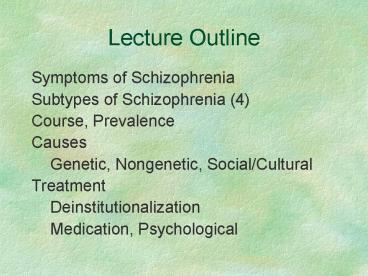Lecture Outline - PowerPoint PPT Presentation
1 / 12
Title:
Lecture Outline
Description:
unsubstantiated ideas and opinions contrary to a person's ... Brain structure and function. Brain chemistry. Cultural and Social Factors. in Schizophrenia ... – PowerPoint PPT presentation
Number of Views:16
Avg rating:3.0/5.0
Title: Lecture Outline
1
Lecture Outline
- Symptoms of Schizophrenia
- Subtypes of Schizophrenia (4)
- Course, Prevalence
- Causes
- Genetic, Nongenetic, Social/Cultural
- Treatment
- Deinstitutionalization
- Medication, Psychological
2
Symptoms of Schizophrenia
- Delusions
- - unsubstantiated ideas and opinions contrary to
a persons background and not held by members of
the persons cultural or ethnic group - - false beliefs, crazy ideas
- - Includes paranoid, persecution, grandiose,
thought withdrawal or insertion, and mind reading - Hallucinations
- - perceptions that are not based in reality
- - may be auditory, visual, olfactory,
tactile, or - gustatory
- - Auditory hallucinations most common
(hearing voices conversing or commenting
on behavior)
3
Symptoms of Schizophrenia
- Disorganized speech (Formal Thought Disorder)
- - Derailments
- - Neologisms
- - Tangential response
- - Word salad (incoherence)
- Grossly disorganized or catatonic behavior
- Negative symptoms (absence of normal )
- -Flat affect
- - Limited speech
- - Lethargy
4
DSM-IV Diagnostic Criteria for Schizophrenia
- - 2 of the previous symptoms
- - Social/occupational dysfunction
- - Presence of disturbed behavior for at least 6
months, including at least 1 month of active
symptoms - - Exclusion of other conditions
- schizoaffective and mood disorder
- substance abuse or medical condition
- pervasive developmental disorder
5
Subtypes of Schizophrenia
- Paranoid
- Catatonic
- Disorganized
- Undifferentiated
- Residual
6
The Course of Schizophrenia
- Prodomal phase
- symptoms have not yet appeared but personality
changes are often noticed by others - marked by deterioration from higher level of
functioning - Active phase
- symptoms such as hallucinations and delusions
present - Residual phase
- symptoms may be episodic or continuous
7
How Common Is Schizophrenia?
- The prevalence of schizophrenia is about 1
- Occurs equally commonly in males and females
- Typical age of onset is
- 1425 years for men
- 2435 years for women
- Men spend more time hospitalized than women
8
Causes of Schizophrenia Genetic Factors
- Family studies -probability of developing
schizophrenia - Twin/adoption studies - distinguish between
genetic and environmental factors - Attentional dysfunction and eye-tracking
abnormalities - two potential markers for
schizophrenia - Schizophrenia the result of several interacting
genes, not a single gene
9
Etiology of Schizophrenia Nongenetic Risk Factors
- Viral infection
- Life-stress
- Demographic and socioeconomic status
- Communication and expressed emotion
- Brain structure and function
- Brain chemistry
10
Cultural and Social Factors in Schizophrenia
- Schizophrenia is more common among
- people raised in large cities
- new immigrants
- divorced and single people
- those with lower socioeconomic status
- social drift theory
- social stress theory
- differences in access to medical care
11
Past Approaches to Treatment
- Hospitals - house patients and provide milieu
treatment - Deinstitutionalization
- failed to provide community-based treatment
- many patients have become homeless and untreated
12
Current Treatments
- Medication treatments
- neuroleptic drugs
- Psychological treatment
- reduction of expressed emotion
- token economies
- social skills and cognitive training































